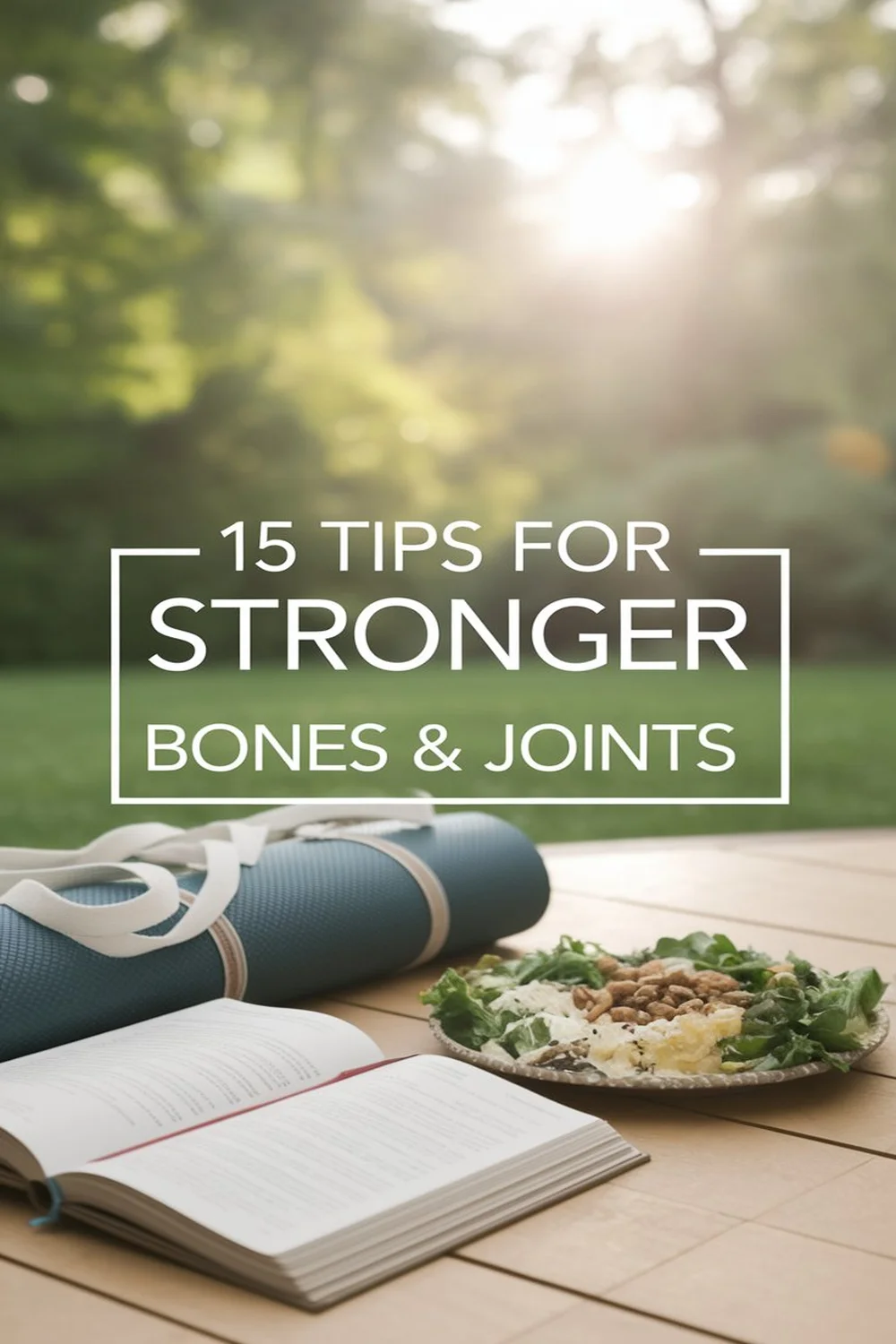To strengthen your bones and joints, prioritize calcium-rich foods and incorporate vitamin D for ideal absorption. Engage in weight-bearing and strength-training exercises, while also staying active with low-impact activities. Use proper techniques during workouts to minimize injury risk, and make sure you get adequate rest and recovery. Avoid smoking for better bone health and maintain regular check-ups for proactive care. Discover additional strategies that can further enhance your bone and joint strength.
Prioritize Calcium-Rich Foods
To strengthen your bones and joints effectively, it’s essential that you prioritize calcium-rich foods in your diet. Calcium is a crucial mineral that plays a critical role in maintaining bone density and overall skeletal health. Foods such as dairy products, leafy greens, almonds, and fortified plant-based alternatives provide significant amounts of calcium. Consider incorporating yogurt, cheese, and sardines into your meals, as they contain high levels of this mineral. If you’re lactose intolerant, opt for calcium-fortified soy or almond milk. Additionally, paying attention to your overall dietary patterns, ensuring adequate protein intake, and limiting excessive salt and caffeine can further enhance calcium utilization. By prioritizing these foods, you’re laying the foundation for stronger bones and joints.
Incorporate Vitamin D for Calcium Absorption
While calcium is essential for bone health, it’s equally important to guarantee you’re getting enough vitamin D, as it enhances your body’s ability to absorb calcium efficiently. Vitamin D can be obtained through sunlight exposure, certain foods, and supplements. Aim for 600-800 IU daily, depending on your age and health status. Fatty fish, fortified dairy products, and egg yolks are excellent food sources. Regularly check your vitamin D levels with your healthcare provider, as deficiencies can lead to weakened bones. If you’re struggling to meet your requirements through diet and sun exposure, consider a supplement. Remember, optimal calcium absorption hinges on adequate vitamin D intake, making it an essential component of your bone and joint health strategy.
Engage in Weight-Bearing Exercises
Engaging in weight-bearing exercises is essential for maintaining strong bones and joints, as these activities stimulate bone formation and enhance bone density. When you participate in exercises like walking, running, or jumping, your bones respond by becoming stronger to support the increased load. Aim for at least 30 minutes of weight-bearing activity most days of the week. This type of exercise triggers a biological response that aids in calcium and mineral absorption, reinforcing your skeletal structure. Additionally, weight-bearing exercises improve overall joint function and can reduce the risk of osteoporosis. Remember to choose activities you enjoy to stay motivated, and consult with a healthcare professional before starting any new exercise regimen, especially if you have existing health concerns.
Recommended Items
Here are our recommended health and wellness essentials—feel free to explore!
Include Strength Training in Your Routine
Incorporating strength training into your routine complements weight-bearing exercises and further enhances bone health. By engaging in resistance activities, you’ll stimulate bone density and muscle strength, reducing the risk of fractures and conditions like osteoporosis. Aim for at least two sessions a week, targeting all major muscle groups.
Here’s a quick reference for strength training exercises:
| Exercise | Benefits |
|---|---|
| Squats | Strengthens legs, improves balance |
| Push-ups | Builds upper body strength |
| Deadlifts | Enhances core stability |
| Lunges | Supports joint stability |
Incorporate progressive overload by gradually increasing resistance. Always consult a healthcare professional before starting a new workout regimen to tailor exercises to your individual needs for best results.
Stay Active With Low-Impact Activities
Staying active with low-impact activities can greatly benefit your bone and joint health, especially if you have concerns about high-impact exercises. Low-impact activities, such as walking, swimming, cycling, and yoga, provide essential movement without excessive strain on your joints. These exercises enhance flexibility, improve blood circulation, and strengthen the muscles surrounding your bones, contributing positively to overall bone density. Additionally, engaging in low-impact workouts can help to reduce the risk of injury while still allowing for a balanced fitness routine. Aim for at least 150 minutes of moderate activity each week, integrating a variety of exercises to keep your routine stimulating. Remember, consistency is key to maintaining bone and joint health over time.
Action Steps for Stronger Bones & Joints
Maintain a Healthy Body Weight
Maintaining a healthy body weight is essential for supporting bone and joint health, as excess weight places additional stress on your joints. When you’re overweight, the load on your knees, hips, and spine increases, heightening the risk of injury and conditions like osteoarthritis. To manage your weight effectively, focus on a balanced diet rich in fruits, vegetables, lean proteins, and whole grains. Incorporate regular exercise, such as strength training and low-impact activities, to build muscle support around your joints. Monitor your portion sizes and be mindful of caloric intake. Maintaining a body weight within a healthy range not only reduces joint stress but also enhances your overall physical function, promoting longevity and quality of life.
Limit Caffeine and Alcohol Intake
While it may be tempting to indulge in caffeinated beverages and alcoholic drinks, limiting these substances can greatly contribute to better bone and joint health. Excessive caffeine consumption may lead to decreased calcium absorption, ultimately compromising bone density. It’s advisable to restrict your caffeine intake to about 400 mg per day, roughly equivalent to four cups of brewed coffee.
Similarly, too much alcohol can hinder bone formation and disrupt the body’s calcium balance. Drinking in moderation—up to one drink per day for women and two for men—helps maintain ideal health. By being conscious of your caffeine and alcohol consumption, you’ll better support your bones and joints, reducing the risk of osteoporosis and joint issues as you age.
Stay Hydrated for Joint Health
Proper hydration plays an essential role in maintaining joint health. Water serves as a lubricant for your joints, ensuring smooth movement and reducing friction during physical activities. When your body is dehydrated, you may experience joint stiffness and increased discomfort. To support ideal joint function, aim to drink enough water throughout the day, especially before, during, and after exercise. The general recommendation is to consume at least eight 8-ounce glasses daily, but your individual needs may vary based on activity level and climate. Be mindful of signs of dehydration, such as dry mouth, fatigue, or reduced urine output. By prioritizing hydration, you’ll promote better joint flexibility and overall comfort in your daily movements, enhancing your quality of life.
Focus on Omega-3 Fatty Acids
Hydration is just one piece of the puzzle when it comes to joint health; incorporating omega-3 fatty acids into your diet can further enhance your joint function and reduce inflammation. These essential fats, found in fish like salmon, walnuts, and flaxseeds, play a critical role in maintaining the health of cartilage and synovial fluid, which cushion your joints. Research indicates that omega-3s can decrease joint stiffness and alleviate pain, making them particularly beneficial for individuals with arthritis. Aim for a balanced diet that includes these fatty acids to support overall joint health. Consider incorporating fatty fish into your meals a couple of times a week, or use supplements if needed, after consulting your healthcare provider. Prioritize this dietary change for peak joint function.
Consider Joint Supplements
As you explore ways to support joint health, considering joint supplements could be a valuable addition to your routine. These supplements often contain key ingredients, like glucosamine and chondroitin, which may help reduce joint pain and improve mobility. Some studies suggest that omega-3 fatty acids, found in fish oil, can also support joint function and inflammation reduction.
Before starting any supplement, it’s important to consult with a healthcare professional to verify they’re appropriate for your needs. Look for products that have been third-party tested for quality and purity. Integrating these supplements with a balanced diet and regular exercise can enhance your joint health, potentially leading to increased comfort and improved overall function in daily activities.
Practice Good Posture
Supporting joint health extends beyond supplements; it also involves practicing good posture. Maintaining proper alignment while sitting, standing, or walking helps reduce unnecessary strain on your joints. This not only enhances joint function but also promotes overall bone health.
To guarantee you’re practicing good posture, remember these key points:
- Keep your shoulders back and relaxed to avoid tension.
- Distribute your weight evenly on both legs when standing.
- Use ergonomic furniture to support proper spinal alignment.
Use Proper Techniques During Physical Activities
When you engage in physical activities, using proper techniques is vital to minimize the risk of injury and maintain strong bones and joints. Proper mechanics, such as aligning your knees over your toes during squats, help distribute forces evenly, preventing undue stress. Always warm up before diving into strenuous activities, as this increases blood flow to your muscles and joints. Focus on using your core to stabilize your body during movements, which protects your lower back. Be mindful of your breathing; exhaling during exertion can enhance efficiency. Finally, listen to your body. If you feel pain instead of normal discomfort, it’s important to stop and reassess your technique. Prioritizing these factors will keep your bones and joints healthier over time.
Ensure Adequate Rest and Recovery
Engaging in physical activities while using proper techniques is only part of the equation for maintaining strong bones and joints. Adequate rest and recovery are significant components that allow your body to heal and strengthen. When you don’t give yourself enough time to recover, you risk fatigue, injury, and degraded joint function.
To optimize your bone and joint health, consider these essential recovery strategies:
- Prioritize sleep for muscle repair and growth.
- Incorporate active rest days to maintain mobility without stress.
- Listen to your body; pain is often a signal for rest.
Avoid Smoking for Healthier Bones
Although it may seem surprising, smoking greatly compromises bone health and contributes to joint problems. Nicotine restricts blood flow, reducing the necessary nutrients needed for bone regeneration. Studies show that smokers have lower bone mineral density, increasing the risk of fractures and osteoporosis. Additionally, smoking impairs the absorption of calcium and vitamin D, two vital elements for maintaining bone strength. Joint health also declines due to smoking, as it can lead to inflammation and contribute to conditions like arthritis. By avoiding smoking, you can greatly enhance your overall bone and joint health. Quitting not only benefits your bones but improves your overall well-being, reducing the long-term risks associated with smoking. Prioritizing a smoke-free lifestyle is essential for maintaining robust skeletal health.
Get Regular Check-Ups and Screenings
Regular check-ups and screenings are essential for identifying potential bone and joint issues early on, ensuring timely intervention and treatment. When you schedule these visits, you’re taking a proactive step towards maintaining your health. It’s important to be vigilant, as undiagnosed conditions can lead to significant complications.
Consider the benefits of regular assessments:
- Early Detection: Catch problems before they become serious.
- Informed Decisions: Understand your bone density and joint health.
- Personalized Care: Receive tailored recommendations to strengthen your bones and joints.
Don’t wait until discomfort arises; make these appointments a part of your routine. By prioritizing regular check-ups and screenings, you empower yourself to maintain peak bone and joint health throughout your life.











